Mavericks of War
ALTERNATE ROUTES TO SUCCESS
Mavericks of War
The Unconventional, Unorthodox Innovators and Thinkers, Scholars, and Outsiders Who Mastered the Art of War
Jason Ridler
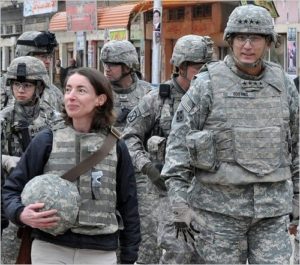
ALTERNATE ROUTES TO SUCCESS
Mavericks of War
The Unconventional, Unorthodox Innovators and Thinkers, Scholars, and Outsiders Who Mastered the Art of War
Emma Sky with American troops in Iraq
Introduction
In my EN 102 class at Valley Forge Military College, I assigned each cadet to make a class presentation on a battle – and I asked them to uncover the conflict’s hidden lessons, or the story beneath the story. One cadet asked if he could present the Battle of the Aleutians, a World War II battle (actually, a campaign) of which I had never heard. While this battle was minor in both strategic and military-science value, U.S. forces managed to capture a fully intact Akutan Zero fighter, the Japanese airplane that had been flying rings around ours. Studying this Zero gave us much-needed technical design
insight and ended up changing the course of the entire Pacific war – an unexpected twist to the story.
Jason Ridler sets out to do something similar in his singular book, Mavericks of War: The Unconventional, Unorthodox Innovators and Thinkers, Scholars, and Outsiders Who Mastered the Art of War. Here he rescues nine counter-narratives, or buried narratives, of unconventional thinking that turned out to be correct from a century of military history. He finds treasure on a par with an Akutan Zero.
The stories of these contrarians, some famous and some obscure, give us both historical insight and personal profiles in perseverance. The lessons which the author breaks down for his readers apply to all of us, in any field of endeavor. While not all of these unorthodox thinkers were “victorious” in their time (certainly including Lawrence), they have all been proven right by history. It is a good example of what I call new military history, history that takes in the broader cultural issues beyond the battlefield, similar, in its way, to Max Boot’s outstanding The Savage Wars of Peace: Small Wars and the Rise of American Power, which looked at valuable lessons to be found in “minor” conflicts often overlooked for more spectacular world wars.
Because he is a teacher as well as a scholar, Jason Ridler has a knack for clearly explaining complex issues. You will enjoy these episodes featuring cultural acumen and the courage of his or her convictions against the animosity of the “maw of conventional warfare and industrial violence.” These are innovators who brought very different skill sets to the battlefield, and we all can learn from them.
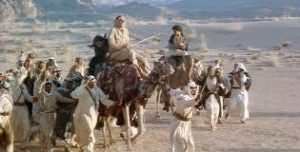
Still from David Lean’s 1962 film “Lawrence of Arabia,” depicting the prototype maverick.
Book Review “Mavericks
of War” Tom Durwood
Jason Ridler begins his ambitious and scholarly look at “Mavericks of War” with the most well-known of the group, T.E. Lawrence (Lawrence of Arabia). The author uses Lawrence as a sort of model for the lesser-known figures to come in a wide-ranging narrative. He author sets Lawrence against British Colonel Gerald Leachman, a political officer who showed neither empathy or knowledge of Arabic culture. Leachman was, of course, resistant to Lawrence’s innovative ideas about how to help the Arab tribes overthrow the Ottomans, and history has treated him harshly for it. Success
in war depends on a deeper understanding more than on a greater firepower. “For every dozens of Leachmans, there are very few Lawrences,” Ridler writes. The question he poses is this: Could other kinds of experts, one facing similar frictions with the armed services, have similar impacts on military affairs?” The answer is yes, and here they are. The eight Mavericks who follow in Lawrence’s footsteps share a willingness to find an alternative to “a legacy of brutality and ignorance” in foreign lands:
Wilhelm Wassmuss, a German diplomat turned ex-patriot, Wassmuss at one point lost himself in Middle Eastern society. “Rarely seen in public, he spent three years in an obsessive study of the desert and its peoples.” He surfaced as Consul to Iran in the First World War and turned into “the Lawrence of Persia”, helping that nation generate a rebellion against Britain.
Monty Woodhouse, classicist, mathematician, Lord Terrington of Huddlefield, a Greek scholar who was parachuted into occupied Greece in 1942, Woodhouse played a key role in the Greek resistance.
Cultural anthropologist Cora Du Bois, OSS Research and Analysis Chief in Southwest Asia cultural who illuminated new methods for clandestine operations in Indonesia.
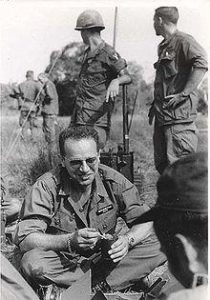
Correspondent Bernard Fall in Vietnam
Bernard Fall, a child solder in occupied France, Fall grew into “the man who knew the war ” in Vietnam. Fall’s long-time experience in Indochina as a correspondent and political scientist in the 1950’s and 1960’s gave him alternate views of American policy. Fall died prematurely when he stepped on a land mine while on patrol with American forces.
Advertising executive Edward Lansdale and archeologist Charles Bohannon formed a partnership in the Philippines that produced America’s first postwar counterinsurgency success.
Gertrude Bell, a risk-taking Victorian archeologist, mapmaker, and adventurer whose extensive travel among the tribes of Syria, Asia Minor, Mesopotamia, and Arabia proved formative to British imperial policy.
Sarah Chayes helped in the effort to rebuild Afghanistan by starting a dairy cooperative in Arghand. Her experience in the Peace Corps and reporting the Kosovo war led her to her own
conclusions about how to most effectively navigate among the warlords and factions of Afghanistan.
Emma Sky became an influential voice in conflict resolutions in the complex landscape of the Middle East. She served as political advisor to NATO, the British Council, and Generals Ray Odierno and Kip Ward, among others.
How does Jason Ridler know all of this? One answer is time: he spent fifteen years
on his subjects. Like them, he has applied constant effort over a long time to produce a thorough and original study.
Along the way, Ridler plants seeds of his own theory of mavericks, and why they succeed. Each of the subjects represents a sort of success story, as each man and woman had to overcome obstacles of conventional thought and intransigent, often moneyed interests, some (Cora du Bois) more than others. Clearly one such unorthodox thinker himself, Ridler shares the complete Maverick theory in his conclusion, listing the elements that these men and women share in common. My favorites are Career Immunity,
Capacity to Learn After Mastering Their Own Field, and Helping Others as a Calling.
Jason Ridler works hard for his readers. The book is highly organized and highlights the best quotes as sub-headlines. He anchors his ambitious narrative with 45 pages of 12-point, single-spaced notes. In these footnotes, he details and expands his theses. Here is a typical passage from deep within the Notes section of Mavericks of War:
As soon as German armies marched on France, “the German government, in collaboration with the general
staff, was working out a far-reaching programme of revolution which was directed equally against the British Empire and Imperial Russia.”
I never knew that. I’ve never even heard about that. Such an effort, to destroy your enemies from within, is not unlike current attempts to undermine certain Western democracies from within (via cyberspace). High value for a sentence found in small type, deep in an Author’s note. The remarkable thing to me is that Jason Ridler is writing as carefully here as he would on his opening page. This, I think, is a sign of a genuine scholar – their devotion to a topic is total.
A friend of mine who teaches at Valley Forge Military College despairs of the marginalized state of military history today. All civilians need to know and understand the hard-won lessons of war. I used to sit in my friend’s class in the back row whenever I could. I remember one day he jumped from false promises in American elections to the example of the Luftwaffe’s empty promise to Sixth Army Field Marshall Friedrich Paulus in 1943 that they could keep the supply lines between Berlin and Stalingrad full and open (they couldn’t, and everyone knew they couldn’t). The destruction of the Sixth Army ensued. Great stuff.
Reading Jason Ridler’s Mavericks of War is like sitting in the back row of that class – a dedicated scholar, clear exposition, an infinitely revealing topic, and fresh historical subjects who are mysteriously connected to one another, and to us.
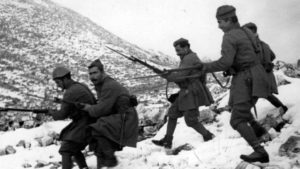
Futile Greek action during the Battle of Crete, which secured the Nazi invasion of Greece (1941)
Jason Ridler Interview
October 2018
- You did considerable research for “Mavericks of War.” How did your opinions of military innovation change over the course of writing this
book?
That there is an essential tension, to use Thomas Kuhn’s la nguage, between the cultures of conventional and unconventional war. And sometimes it takes unorthodox outliers to find a way through the layers of conflict in innovation. What shifted in my thinking was that there are far more women who are instrumental in changing military affairs than I first considered (though a rare minority in the early half of the century) and we need to be far more inclusive of them if we want the wars of tomorrow to look fare better than the wars of today. Also, that cultural awareness and empathy are as important as PGMs and SMEs who study cyberwarfare. If you’re going to work in other people’s countries to fight your wars, ignorance of their needs, culture, and peoples will likely generate you even more enemies as you prosecute your war aims. I say this starting as a science and technology historian who saw just how difficult it was when empirical experts were
ignored by the military, but also how much good was generated once these “two cultures” stopped thinking of each other as “eggheads” and “idiot soldiers” and worked toward common purpose.
- You give readers excellent examples of both cultural and technical innovators. Which category do you think has had a bigger impact on the
Art of War?
Cultural, though I’m currently quite biased. It’s hard to imagine the landscape of actual warfare in the post-1918 period without the influence of T. E. Lawrence. The insurgencies, revolutions, and guerrilla campaigns of the globe over the next one-hundred years echo with his ideas which are rooted in cultural, strategic, as well as technical appreciations of how to fight war against those who choose to dominate by mass and technology. Compare that to tank use today. Whose ideas are in play more in South America or online, those of Lawrence or those of Guderian? It helps that Lawrence was a strategist as much as a tactician, of course.
- Can you characterize for the general reader the influences or legacies of three subjects central to your study: Leachman, Lawrence and
Chayes.
Leachman was the archetype imperial soldier, but with a twist-he studied
culture to abuse it for imperial ends, with racist disdain for the Arabs and
other Middle Eastern peoples he commanded or worked with. The legacy
here is of the arrogant Westerner who believes himself superior, studies the
culture to manipulate it, and creates the conditions of hatred that for
Leachman would end in his murder and a new Arab revolt during the
creation of modern Iraq.
__________________________________________________________________________________
It’s hard to imagine the landscape of actual warfare in the post-1918 period without the influence of T. E. Lawrence.
__________________________________________________________________________________ Lawrence, who must be seen as a tool of Western imperialism and held himself and the British above the Arabs, was nonetheless a far more empathetic and valuable figure in transforming warfare within his domain. His study of culture and appreciation of the Arab peoples was far more authentic and genuine than Leachman, a man whom he saw as an inferior specimen in all things due to his violent temper and demeaning conduct. Lawrence also had a gift for writing, saw it as a tool of influencing others,
and viewed tradition and innovation as invaluable in fighting a conventional enemy. Diplomat, soldier, adviser, author, scholar, with the courage to not only die but also ignore his superiors orders to lead a revolt that would (he hoped) give the Arabs a position of authority when the war ended. That said, Lawrence knew that France and Britain would renege on their promise of an independent Arabia, so his death-march to give the Arabs as strong a position as possible against this truth is both damning as well as heroic.
Chayes’ influence in Afghanistan was more akin to Bernard Fall regarding Vietnam: speaking truth to power. She did this against the corrupt warlords the US backed in the wake of the Taliban’s defeat; she did it against the increasingly corrupt Karzai government; and when she realized that General Petraeus would never deal with what she and others uncovered as the true power structure in the country (a vertically integrated criminal syndicate which used the central government as a front), she wrote a book about this failure and left government service not long after. Fall never held the same kinds of positions of authority as Chayes. He was locked out of those discussions because of this kind of critique: he saw French failure in Indochina and pulled no punches when he saw the US falling into a similar trap. For such insights he became a tar baby for most in the policy world (though soldiers often read his work, especially SOF troops who dealt with unconventional warfare). I guess this is progress of a sort even if both figures walked away from war efforts they saw as intrinsically flawed.
Gertrude Bell
- Frank Sulloway, an historian of science, believes that innovators and rebels tend to be last-born. Psychology professor Adam Grant believes original thinkers are “givers.” Did you find any trait that your
innovators had in common?
Yes, all but two had civilian careers. Fall was a teenage-soldier during the occupation of France, but was an academic by trade. Wilhelm Wassmuss, the so called “German Lawrence,” was a diplomat. But the re st had careers outside the profession of arms. They had somewhere to go if they said “you’re fighting this war wrong.” And almost all of them had a deeper appreciation of other cultures than is normally associated with professional soldiers. Indeed, a point I make in the book is that conventional warfighters are trained to dehumanize an enemy in order to kill them.
While many of the figures in MAVERICKS OF WAR would fight in combat and certainly had no problem killing enemy soldiers, they also (by training, inclination, or experience) became fascinated and immersed with a people who were not themselves. For many this was tinged with exoticism and racism and the biases of their age, but not all. Chayes in Afghanistan and Emma Sky in Iraq developed a deep well of admiration for the peoples of Afghanistan and Iraq, and the guts to walk among them and see how poorly they were often treated, all in order to make effective changes to US and
coalition strategies. And that idea that foreign cultures are worth respect and admiration (as opposed to Leachman, who saw it as a means of manipulation and disguise on intelligence missions) made a difference.
- What three books would you recommend to the general reader or
college student with an interest in military history?
Azar Gat’s A History of Military Thought, Richard Rhodes, The Making of the
Atomic Bomb, and John Lynn’s Battle: Thought, Tech, Combat and People. Each will make you realize the depths involved in military affairs. They are all exceptionally well written, which makes it a lot easier to read than other tomes where the data is the ends, and writing is barely the means. A contemporary one would be Thomas Ricks’ Fiasco: American Adventurism in
Iraq. Ricks’ work was what solidified my desire to shift from the history of science and technology to culture and unconventional warfare. I owe him a great debt.
- Have the “mistakes” in war which innovators then corrected occurred more at the strategic level (why are we fighting, how are we fighting) or
at the tactical level (how do we execute the plan)?
Not always, but they are related. Edward Lansdale and Charles Bohannan walked into a failing COIN strategy in the Philippines, which was reflected in failed operations (sweeps, torture, abusing the peasantry) and failed government policy in law and economics (abusive landholding practices that made the communists attractive). Their approach was full spectrum (Bohannon’s book on counter-guerrilla warfare, which is never cited by current COIN afficianados including Petraeus and his ilk, spends a lot of time on government policy and law as well as ethics), but both knew that without a legitimate government authority as an alternative, one with a figure that stood as an honest broker, all tactical and operational reforms were band-aids on a bullet wound. As a sage French officer noted in Indochina before the fall at Dien Bien Phu, all war is “political war.” And that means a political strategy must be in play or else you’re just buying time to leave (as Chayes argued in Afghanistan). Without a strategy that honestly views the problems of the host country they are working with (and I deal mainly with insurgencies and guerrilla warfare since they are
the norm not the exception), operational and tactical changes will buy time, not victory.
__________________________________________________________________________________
There are far more women who are instrumental in changing military affairs than I first considered, and we need to be far more inclusive of them …
__________________________________________________________________________________
- In her digital reimagining of Gettysburg, Anne Knowles puts forward the idea that spatial narratives and geographic context count, and that many disciples working together are needed to understand a battle.
What other trends do you see entering the field of military history?
Of two divergent paths that occasionally talk: specialization into niche
subjects that may have profound impacts on all levels of war and may need a
new lexicon (cyberwarfare) and the old wine in new bottle discussion of
“hybrid” warfare focused on Russian influence operations and full spectrum
conflict. My god, do my students at Johns Hopkins want to study
Russian unconventional warfare. Such things were an anathema in the 1990s
and even in the post 9/11 wars. I’m very glad to see it.
8. Where will the next innovator come from? What aspects of the Art of War need new thinking?
That’s the fun part. We don’t know. But if they’re like the figures in MAVERICKS OF WAR they will be civilians who see their skill set needed by a modern armed force that does not like the war its fighting. Plus ca change, perhaps. Culture and economics seem to be the watchwords these days, especially as it relates to resource management. So, what enviro-warriors will arise to challenge old paradigms? Chayes came from the Peace Corps. Wherever it is I hope it’s not from the usual suspects. Let them emerge from the Occupy movement, or the EPA, or some failed Silicon Valley start-up. Each would bring fresher ideas than the usual suspects.
- You conclude that “Success in a global context requires deeper understanding as much as greater lethality.” Will this still apply with
cyberspace and outer space becoming new theaters of war?
Yes, though they are hardly new. The one I’m most curious about and least talented with is cyberspace and how it operates within social media and economic, propaganda and economic warfare to the old guard. The point I’ve seen that fascinates me as that the traditional concepts of conflict are poor fits for these modern versions of old problems, and deny us the variety
of tools possible within this field. To quote Yoda, we will need to unlearn what we’ve learned. Which reminds me, paradoxically, of a historical analogy-Lawrence’s love of Marshall Saxe’s career in 18th century warfare. Saxe was a great captain of his age but in Lawrence’s time was seen as antiquated and irrelevant compared to Napoleon, Clausewitz, or Motke the Elder. So who will read Lawrence and see his approach to warfare as applicable to influence operations and trolling populations or attacking banking systems instead of FOBs or assassinating political leadership? Stay tuned.

Cora Du Bois, OSS Research and Analysis Chief in Southwest Asia
- Current writings in the field of innovation cite the difficulty of
fostering entrepreneurship within the corporation. Are there specific
procedures you would change in the U.S. Armed forces?
Career paths that promote innovation and its threshold for failure in the wars we are seeing emergent and not the ones that sell the most gear. If there is no career benefit in saying “we’re doing it wrong” then innovation
will arrive as it does with Mavericks, an outsider who has the knowledge you FAILED to generate in-house is brought in. But that is a freelance fix which should become a professional career tract. The British famously noted that they find their weird eccentrics, give them a desk job and keep them on retainer until their strange skill set is needed. In the US, there’s a tradition of driving such folks out.
____________________________________________________________________________
Let the new warriors emerge from the Occupy movement, or the EPA, or some failed Silicon Valley start-up. Each would bring fresher ideas than the usual suspects.
____________________________________________________________________________
- The Israeli army has a tradition of “rosh gadol,” in which everyone in a regiment is listened to on an equal basis. Is that the decision-making
model for future armed forces?
Depends on the quality of the candidate, the political culture of the unit, and its tolerance for contrarians. If everyone is listened to because they believe the same thing, who cares? Eliot Cohen noted something that speaks to a cultural norm he thought needed to be challenged- the old saw of “don’t come to me with a problem, come to me with a solution.” This adage reads as positive, but misses the first beat of the issue: leadership must acknowledge there is a problem. That is part of the burden of responsibility-that problem resulted from many factors but it is your problem. Following that cultural tag “no problem, just solution” actually distorts this truth. Very Orwellian. If that’s the cultural norm, I don’t care how many people are listened to because they will all say there are no problems. And that is dangerous, as we saw in Iraq (and that Emma Sky contended with in the final case study of Mavericks of War). The US can’t understand why Iraqis view them as occupiers . . . as they occupy a country that they did not invite, for WMDs that were never found, and who seem to have no knowledge of the people they are now patrolling.
Charles Bohannon famously disagreed with his boss the “Ugly’ American Edward Lansdale about Ramon Magsaysay as a possible candidate for Secretary of Defense and then President of the Philippines, but “Bo” had working relationship with Lansdale where his critiques could be heard. He later said Lansdale was right and he was wrong. But Bohannan’s voice of
dissent, the “problems” he saw, allowed corrective measures to be taken to get Magsaysay ready.
- If history is written by the winners, are there untold narratives of innovation that are lost to us – because we have little interest in
histories of the “losing” side?
Hate to tell you this but the US has lost many wars and produced more manuscripts than the nations who won. How many books about the defeat of the Confederacy exist from folks with empathy or sympathy or connections to the failed Confederate states? How many books on Vietnam exist? And losing those wars impacts how they are written. There’s a fascination with that failure that is a great pull to research, good and ill.
That said, in the case of the War of 1812, it’s ignored. But you’re right:
nothing sells like victory.
Again, Bohannon made an excellent point in a document on Americ a’s experiences of guerrilla warfare, in which he saw many successes . . . that were ignored or lost to the professional soldiers who were fighting guerrilla warfare in the South East Asia in the Cold War. If the US had studied its own little wars, made it a priority to remember and dissect them, the experience in Asia would be different. He contested that the major ideas of COIN were learned by those who served in the Indian Wars, or the Philippines, or Cuba, or the US intervention in the Russian Civil War. But they had to be re-learned. He and Lansdale spent a lot of time hunting for works by those who worked in these fields because they were few and far between, even though these were later viewed as “victories.”
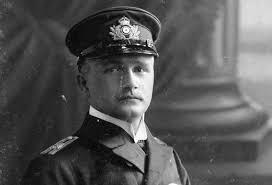
Wilhelm Wassmuss
The two biggest “fails” I noted in the book were Wilhelm Wassmus and Bernard Fall. Wassmuss’s failure to incite an Islamic revolution against the
British in Persia, Afghanistan and India because its chief asset as policy was that it promised something on the cheap. So it was doomed from the start. Kaiser Wilhelm II thought the project was most excellent because it would instill non-Germans to drain manpower from the British and Russians to deal with havoc in the Middle East and India. But it was also built on lies and on the cheap. That said, Wassmuss dedication to a doomed task helped shape the war in the Middle East when it was most volatile (the defeat of the British at Kut, before the Arab Revolt takes off) and forced the British to deal with his intrigue and violence with various southern Persian tribes. He’s remembered as a clown because of his eccentric nature and bluster and that the audacity of his mission failed, but he also forced the British to fear him and the South Persian tribes who believed his mission. That fear drained resources, time, and focus into the small hornet’s nest of the Great War that was Persia.
__________________________________________________________________________________
Hate to tell you this but the US has lost many wars and produced more manuscripts than the nations who won.
__________________________________________________________________________________
- The British military school Sandhurst once used nine Rules of War
(“MOOSEMUSS”) to break down success and failure in battle.
“Adaptation” has been suggested as the Tenth Rule of War. What
would be your Tenth Rule?
Learn a foreign language and read that country’s history of dealing with the United States. Have your assumptions challenged regularly. It helps reduce the amount of dogma that gets in the way of innovation.
- What is the current state of military history? Everyone needs to understand the dynamics of war, so how can we bring studies like yours
into mainstream curricula?
There’s amazing work being done in military history all the time, including in the popular history realm. Robert Citno is great. Thomas Ricks is writing most historical stuff, including a gripping book on Churchill and Orwell. I like Jorg Muth because he smashes many of the myths the US held sacrosanct about the German Army, going back to the 19th century. Montgomery McFate wrote a book I love, Military Anthropology, which looks at how this brand of academic has worked in military affairs since the 19th century and it is stunning. David Ucko, Antulio Echevarria, and my old
supervisor Sean Maloney continued to do great research in modern warfare with a historical lens.
Indeed, my goal was to turn scholarly research into a book that reads like a novel. I’m no Truman Capote, but I gave it my all, and it thrilled me to no end that Pulitzer-Prize winner Richard Rhodes called Mavericks “that rarest of books, a visceral page-turner which is also a deep examination of an overlooked human resource in war and international affairs—the expert outsider who works from inside while the ambassadors and the generals pace outside the walls.”
A friend said it makes a great book for those who are interested in military affairs but are not scholars. But it’s also great for deep readers of military history because it covers a greater range than most single-battle books: both world wars, insurgencies in the Philippines, the French and US experience in Vietnam, Afghanistan and Iraq. And, if I may be bold, I followed in the tradition of most of the Mavericks and I tried to write well. Rhodes was a firm believer that the tools of narrative can be employed by historians if we still adhere to the rigors of empirical research. I did my best with Mavericks. So far, the reviews have been edifying.
T.E. Lawrence, perhaps the original modern Maverick of War
# # #